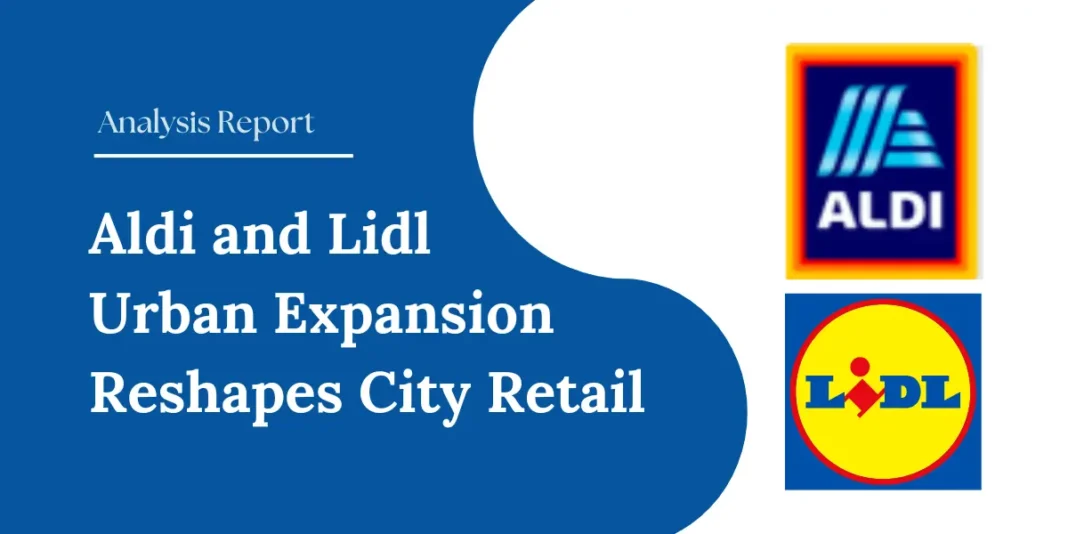The Aldi and Lidl Urban Expansion is transforming city retail as these discount giants push aggressively into urban areas. Traditionally focused on suburban markets, Aldi and Lidl now target city centers, challenging long-dominant supermarket chains like Tesco and Sainsbury’s. Their expansion sparks questions about whether urban shoppers will embrace these discounters as eagerly as suburban consumers have.
This report examines the strategies driving this urban retail transformation, highlights the challenges and opportunities, and analyzes the implications for competitors and the broader grocery market.
A Shift in Strategy: Urban Retail as the New Frontier
From Suburbs to City Centers
Aldi and Lidl have built their reputations as leaders in the discount grocery sector, dominating suburban markets with efficient store formats, low prices, and curated product ranges. Their move into city center grocery stores represents a strategic pivot to capture urban consumer spending.
The Aldi metropolitan expansion has seen the company launch smaller store formats tailored for urban spaces. Similarly, the Lidl downtown presence emphasizes compact stores with quick shopping experiences. Both chains aim to compete directly with existing city retail market dynamics, offering affordability in a space traditionally dominated by convenience-oriented chains.
Catering to Urban Consumer Behavior
Urban shoppers differ from suburban ones in their preferences and priorities. While suburban customers often seek bulk purchases and variety, urban consumers prioritize convenience, proximity, and speed. Aldi and Lidl have adapted by modifying their store formats, product ranges, and services to align with these urban shopping trends.
Challenges in Urban Retail Expansion
Real Estate Constraints
One of the biggest hurdles in urban areas is securing suitable real estate. City centers have limited space, high rents, and significant competition. To address this, Aldi and Lidl are innovating their urban store formats to fit smaller footprints while maintaining their signature product offerings.
Increased Operational Costs
Operating in urban areas entails higher costs, from rent to labor. Ensuring profitability while maintaining low prices is a balancing act for both Aldi and Lidl. Their operational efficiency and supply chain expertise will be crucial in overcoming these challenges.
Established Competition
City centers are home to entrenched players like Tesco Express and Waitrose. These chains have built strong brand loyalty among urban shoppers. For Aldi and Lidl, the challenge lies in breaking through this loyalty with competitive pricing and superior urban retail customer experience.
Opportunities and Competitive Advantages
Affordability Meets Urban Needs
The cost-of-living crisis has heightened demand for affordable shopping options in cities. Aldi and Lidl’s ability to offer high-quality products at low prices positions them as attractive alternatives to traditional city grocers. Their pricing models resonate with cost-conscious urban consumers, particularly younger demographics.
Sustainability and Local Sourcing
Both Aldi and Lidl are leveraging sustainability to appeal to environmentally conscious urban shoppers. Initiatives like reduced packaging, local sourcing, and energy-efficient stores enhance their urban brand perception. These strategies align with growing demand for ethical shopping options.
Urban Logistics Innovation
Efficient logistics underpin Aldi and Lidl’s success in both suburban and urban markets. Their streamlined supply chains and centralized distribution hubs enable them to keep costs low despite urban challenges. This urban logistics strategy ensures consistent product availability and minimizes waste.
Implications for Competitors
Impact on Supermarket Giants
The entry of Aldi and Lidl into urban markets intensifies city center retail competition. Established chains must now balance competitive pricing with premium offerings to retain market share. Tesco and Sainsbury’s, for instance, have responded by expanding their discount ranges and investing in convenience-driven store formats.
Pressure on Independent Retailers
Independent grocers and specialty shops in city centers may face the greatest pressure. Aldi and Lidl’s ability to offer niche products, such as organic and specialty goods, at lower prices threatens the viability of smaller retailers.
Disruption to Delivery Services
Urban shoppers increasingly rely on grocery delivery services. Companies like Ocado and Getir dominate this space. To remain competitive, Aldi and Lidl are expanding their digital capabilities, including click-and-collect and app-based loyalty programs.
Urban Consumer Reception: Will Shoppers Embrace Discounters?
Changing Perceptions
Discount supermarkets have successfully rebranded themselves as smart choices for budget-conscious but quality-driven shoppers. This cultural shift bodes well for their acceptance in urban areas. However, urban consumers’ loyalty will depend on how well Aldi and Lidl balance affordability with convenience.
Adapting to Urban Habits
Time-strapped urban shoppers value quick trips and seamless experiences. Aldi and Lidl must ensure their stores cater to this behavior through optimized layouts and efficient checkout processes.
Capturing Younger Demographics
Young professionals and students, a key demographic in cities, are likely to welcome Aldi and Lidl’s affordability. Their emphasis on sustainable practices and premium product lines enhances their appeal to this audience.
Future Prospects for Aldi and Lidl
Expanding Urban Footprints
Both Aldi and Lidl have ambitious plans to increase their urban retail market share. Investments in real estate, store design, and digital capabilities will be pivotal in this expansion.
Strengthening Customer Loyalty
Building long-term loyalty in urban markets requires more than competitive pricing. Loyalty programs, partnerships with local suppliers, and exclusive promotions tailored to urban shoppers can help cement their presence.
Driving Innovation
The urban market presents an opportunity for Aldi and Lidl to innovate further. From AI-driven inventory management to advanced urban logistics, technological advancements will play a key role in their urban retail growth strategies.
Conclusion: A Transformative Moment in City Retail
The Aldi and Lidl Urban Expansion is reshaping the urban retail landscape. By targeting city centers, these discount chains are challenging entrenched players, catering to evolving consumer needs, and leveraging innovative strategies to thrive in competitive markets.
Urban shoppers, influenced by economic pressures and changing values, are likely to embrace these retailers if they deliver on affordability, convenience, and sustainability. For competitors and industry professionals, the expansion signals a paradigm shift in how city centers cater to grocery needs.
As the discount wars heat up, all eyes will be on Aldi and Lidl to see if they can replicate their suburban success in the heart of urban areas.

